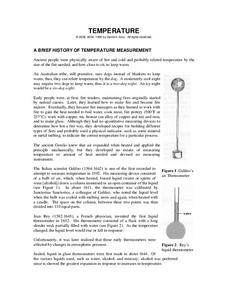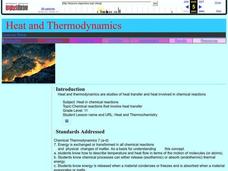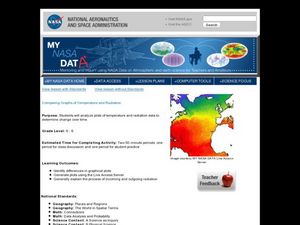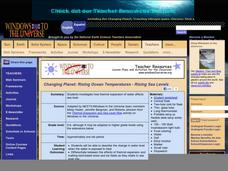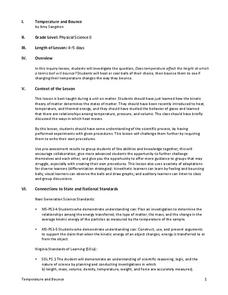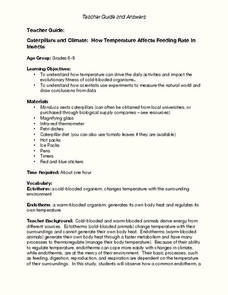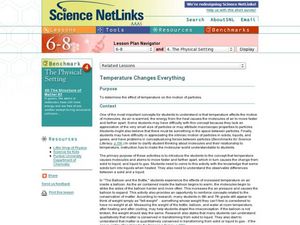Curated OER
Chemistry: Heat Energy Problems
Seven chemical systems are presented. Chemistry kids calculate the final temperature of each system using specific heat capacity of the involved substances. You will need to provide a specific heat capacity table in order for learners to...
Curated OER
Typical Conceptual Questions for Physics I - Heat
This worksheet would make a nifty quiz on the laws of thermodynamics. Nine multiple choice questions assess high schoolers' understanding of energy transfer, specific heat capacity, phase change, fusion, and vaporization. It is short but...
Curated OER
Temperature and Thermal Energy
Examine how heat can be transferred between systems by reconstructing a diagram on energy flow and solving problems on heat flow and work done.
Curated OER
Feeling the Heat
Pupils record temperatures at different locations around campus. They examine the results and draw conclusions about how materials and colors affect the amount of heat produced. They also analyze Los Angeles' temperature records over a...
Curated OER
Typical Numeric Questions for Physics I - Heat
The laws of thermodynamics raise the temperature in your classroom when physics pupils complete this worksheet! They demonstrate their understanding by calculating specific heat capacity, final temperature, amount of work done, and more....
Chymist
Temperature
Three Dog Night isn't just the name of a band; it is also the way an Australian tribe, who used dogs to stay warm, would describe the temperature on a cool evening. After reading about many different ways of measuring temperature, the...
Curated OER
Heat and Thermodynamics
This is actually a 10-day mini unit on thermal energy for your high school chemists. Every avenue is taken to get learners absorbed in heat: a pretest, a PowerPoint presentation, Internet exploration, demonstrations, lab activities, and...
Curated OER
Specific Heat Problems
In this specific heat instructional activity, students solve 4 problems for either the specific heat of the substance, the amount of heat needed to raise the temperature of a substance a particular number of degrees or the amount of heat...
Curated OER
Heating and Cooling Curves
High schoolers experiment with a pure substance and a phase change. In this heating and cooling curves lesson plan, students study the effects of heating and cooling a pure substance to observe a phase change. They determine both the...
Curated OER
Hurricanes As Heat Engines
Students examine sea surface temperatures to see how hurricanes get heat from the oceans surface. In this hurricanes lesson students use the Internet to find data and make line plots.
Curated OER
Differences Between Ground and Air Temperatures
Students examine the differences between air temperature and ground temperature. In this investigative instructional activity students find NASA data on the Internet and use it to create a graph.
Curated OER
Comparing Graphs of Temperature and Radiation
Middle schoolers study plots and use a Live Access Server to generate plots. In this temperature lesson students examine the process of incoming and outgoing radiation.
Oceanic Research Group
Heat Transfer and Cooling
Astronauts train underwater to simulate the change in gravity. An out-of-this-world unit includes three hands-on activities, one teacher demonstration, and a discussion related to some of the challenges astronauts face. Scholars apply...
American Chemical Society
Heat Up and Cool Down
Don't be so dense! Using food coloring, pupils conduct two experiments with the difference in densities of hot and cold water. In the first experiment, learners add dyed hot and cold water into room temperature water and observe how the...
American Chemical Society
Heat - Energy on the Move
Turn up the heat. Individuals conduct two experiments to observe the difference between heated water and air versus cold water and air. Using food coloring, pupils observe the movement of the molecules in the two temperatures of water. A...
Curated OER
Changing Planet: Rising Ocean Temperatures - Rising Sea Levels
As an anticipatory set, young environmental technicians watch a video about how ocean temperatures seem to be changing along with the global climate. They perform a laboratory demonstration with the purpose of observing what happens to...
Curated OER
Heat Energy - Energy Transfer
Here's a great selection of slides for a class being introduced to heat transfer. Types of materials that are good conductors or insulators are covered and the diagrams that accompany the information should make understanding more...
Curated OER
Heat - A Form of Energy
Middle school or high school physical science pupils will warm up to the topic of heat when viewing this set of slides. It covers heat transfer, measurement tools, phase changes, and more. Have demonstrations and examples of the tools...
STEM for Teachers
Temperature and Bounce
Take part in a fun experiment and hold an impromptu bouncing contest with your class. Young scientists heat and cool balls before bouncing them to determine whether temperature changes affect how they bounce. The set of STEM lesson plans...
Curated OER
Caterpillars and Climate: How Temperature Affects Feeding Rate In Insects
Do you eat more when you are hot or when you are cold? Young scientists observe the eating pace of two caterpillars at different temperatures. The differences in endotherm and ecotherm animals' ability to adjust to temperature change...
University of Georgia
Heating and Cooling of Land Forms
Compare heating and cooling rates of different land forms. A lab activity has groups collect data on the rate of heating and cooling of soil, grass, saltwater, fresh water, and sand. An analysis of the rates shows how the different land...
Beyond Benign
The Heat Is On
Explore an exothermic reaction with a quick lab investigation. The activity builds on the previous lessons by examining an ingredient in many shampoos. Scholars record temperature data as sodium hydroxide and water interact.
Curated OER
Temperature Changes Everything
Middle school chemists visit interactive websites in order to discover what happens to molecular motion when heat is added to matter. They conduct an experiment that demonstrates the expansion of matter with the addition of heat. A lab...
Curated OER
Investigating Properties of Water: Temperature
Investigate how temperature affects the density of water and stratification that occurs in bodies of water when temperatures vary. Water of differing temperatures is given different colors to see the layers that form. The lesson plan is...
Other popular searches
- Physics Heat and Temperature
- Science Heat and Temperature
- Heat and Temperature Test
- Temperature and Heat
- Heat and Temperature Change
- Heat and Temperature Metal
- Heat Energy Temperature Burn
- Temperature Heat Expansion
- Temperature Scales and Heat
- Heat and Temperature Unit
- Temperature Heat
- Temperature Flow of Heat







